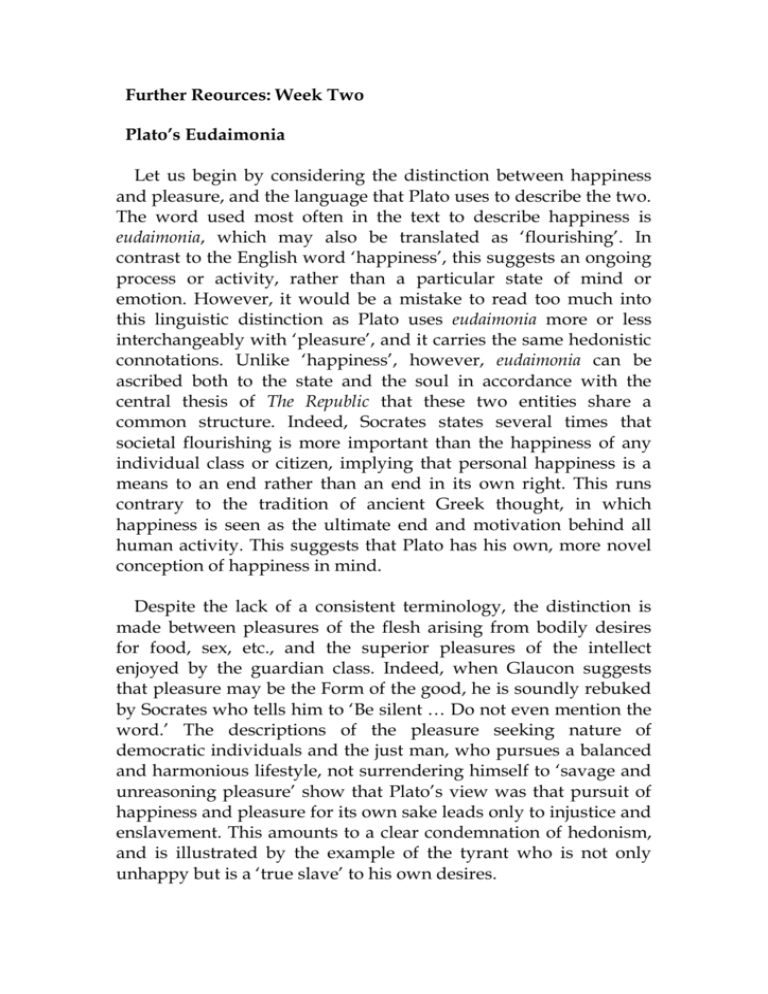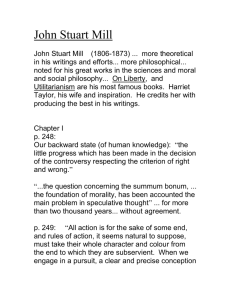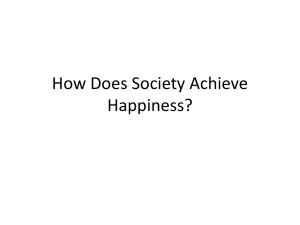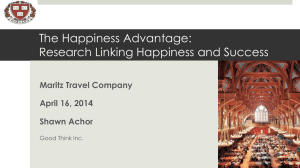Further Reources: Week Two Plato`s Eudaimonia
advertisement

Further Reources: Week Two Plato’s Eudaimonia Let us begin by considering the distinction between happiness and pleasure, and the language that Plato uses to describe the two. The word used most often in the text to describe happiness is eudaimonia, which may also be translated as ‘flourishing’. In contrast to the English word ‘happiness’, this suggests an ongoing process or activity, rather than a particular state of mind or emotion. However, it would be a mistake to read too much into this linguistic distinction as Plato uses eudaimonia more or less interchangeably with ‘pleasure’, and it carries the same hedonistic connotations. Unlike ‘happiness’, however, eudaimonia can be ascribed both to the state and the soul in accordance with the central thesis of The Republic that these two entities share a common structure. Indeed, Socrates states several times that societal flourishing is more important than the happiness of any individual class or citizen, implying that personal happiness is a means to an end rather than an end in its own right. This runs contrary to the tradition of ancient Greek thought, in which happiness is seen as the ultimate end and motivation behind all human activity. This suggests that Plato has his own, more novel conception of happiness in mind. Despite the lack of a consistent terminology, the distinction is made between pleasures of the flesh arising from bodily desires for food, sex, etc., and the superior pleasures of the intellect enjoyed by the guardian class. Indeed, when Glaucon suggests that pleasure may be the Form of the good, he is soundly rebuked by Socrates who tells him to ‘Be silent … Do not even mention the word.’ The descriptions of the pleasure seeking nature of democratic individuals and the just man, who pursues a balanced and harmonious lifestyle, not surrendering himself to ‘savage and unreasoning pleasure’ show that Plato’s view was that pursuit of happiness and pleasure for its own sake leads only to injustice and enslavement. This amounts to a clear condemnation of hedonism, and is illustrated by the example of the tyrant who is not only unhappy but is a ‘true slave’ to his own desires. In defence of pleasure, Plato has two different accounts to offer. The first arises from the distinction between ‘necessary’ and ‘unnecessary’ desires or appetites, which are said to produce corresponding types of pleasure. The desire for bread and simple food, for example, is seen as both productive and necessary, whereas the desire for Sicilian à la carte and Attic pastries is considered extravagant, unnecessary and therefore to be avoided. However, this distinction fails to take into account the happiness or pleasure of the philosopher, which cannot be described as ‘necessary’ in any ordinary sense, and so the analysis must be rejected as incomplete. This defect is resolved in the second account, which identifies three forms of pleasure that correspond to the three different elements of the soul: reason, spirit and appetite, or desire. Here, the distinction between pleasures of the intellect and pleasure resulting from the pursuit of desire or honour—victory in war, for example—is clear, with the philosopher falling into the first category. However, although this provides us with a way of categorising pleasure, it does not bring us any closer to a theory of happiness, as there is no suggestion that it too has three different forms. From this I conclude that Plato considers the notion of pleasure to be insufficient as an explanation of happiness, and that these instead represent two different, but interrelated, concepts. Happiness in its pure or ideal Form is a state of absolute peace, joy and contentment that results from having a perfectly harmonious and balanced soul. This complete absence of inner conflict and turmoil effectively renders the individual immune to all forms of suffering, regardless of their physical circumstances. Such a state of mind may reliably be obtained in one of two ways. Firstly, by acquiring the virtue of justice, where each part of the soul is performing its proper function under the dominion of reason. Secondly, through the practice of philosophy, which brings the soul into equilibrium through the contemplation of what is eternal, beautiful and good. Conventional happiness, as with conventional justice, is a mere image or ‘shadow-picture’ of this Platonic ideal or Form that depends upon the pursuit of transient physical pleasures, and so is itself fleeting and unreliable, consisting at best of a temporary respite from pain and suffering. When described in this way, Platonic happiness bears a striking resemblance to the Buddhist notion of enlightenment—a word whose etymology would not have been lost on Plato—and other spiritual teachings of the East, which presumably both Plato and Socrates would have been exposed to.9 In each case, the important point is that far from depending upon external factors, true happiness arises from within as a result of cultivating the correct state of mind, and cannot be destroyed for as long as the individual continues to maintain their internal balance and harmony, even in the face of great adversity.








